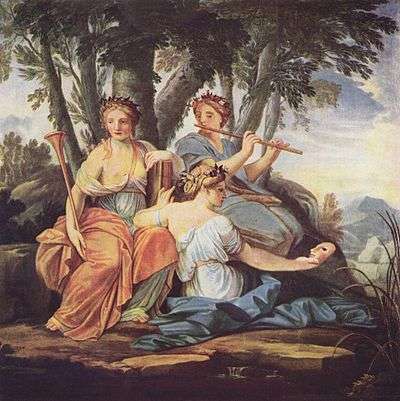Definify.com
Webster 1913 Edition
Muse
Muse
,Noun.
[From F.
musse
. See Muset
.] A gap or hole in a hedge, hence, wall, or the like, through which a wild animal is accustomed to pass; a muset.
Find a hare without a
muse
. Old Prov.
1.
(Class. Myth.)
One of the nine goddesses, daughters of Zeus and Mnemosyne, who presided over song and the different kinds of poetry, and also the arts and sciences; – often used in the plural. At one time certain other goddesses were considered as muses.
Granville commands; your aid, O Muses, bring:
What
What
Muse
for Granville can refuse to sing? Pope.
☞ The names of the Muses and the arts they presided over were:
Calliope
(Epic poetry), Clio
(History), Erato
(Lyric poetry), Euterpe
(music), Melpomene
(Tragedy), Polymnia
or Polyhymnia
(religious music), Terpsichore
(dance), Thalia
(comedy), and Urania
(astronomy). 2.
A particular power and practice of poetry; the inspirational genius of a poet.
Shak.
3.
A poet; a bard.
[R.]
Milton.
Muse
,Verb.
I.
[
imp. & p. p.
Mused
; p. pr. & vb. n.
Musing
.] 1.
To think closely; to study in silence; to meditate.
“Thereon mused he.” Chaucer.
He
mused
upon some dangerous plot. Sir P. Sidney.
2.
To be absent in mind; to be so occupied in study or contemplation as not to observe passing scenes or things present; to be in a brown study.
Daniel.
Muse
,Verb.
T.
1.
To think on; to meditate on.
Come, then, expressive Silence,
muse
his praise. Thomson.
2.
To wonder at.
[Obs.]
Shak.
Muse
,Noun.
1.
Contemplation which abstracts the mind from passing scenes; absorbing thought; hence, absence of mind; a brown study.
Milton.
2.
Wonder, or admiration.
[Obs.]
Spenser.
Webster 1828 Edition
Muse
MUSE
,Noun.
1.
Properly, song; but in usage, the deity or power of poetry. Hence poets in modern times, as in ancient, invoke the aid of the Muse or Muses, or in other words,the genius of poetry. Granville commands; your aid, O Muses, bring,
What Muse for Granville can refuse to sing?
2.
Deep thought; close attention or contemplation which abstracts the minds from passing scenes; hence sometimes, absence of mind. As in great muse, no word to creature spake.
He was fill'd
With admiration and deep muse to hear
Of things so high and strange.
MUSE
,Verb.
I.
1.
To ponder; to think closely; to study in silence. He mused upon some dangerous plot.
I muse on the works of thy hands. Ps.143.
2.
To be absent in mind; to be so occupied in study or contemplation, as not to observe passing scenes or things present.3.
To wonder. Do not muse of me.
MUSE
,Verb.
T.
Definition 2026
Muse
Muse
English

Three Musæ Clio, Euterpe, and Thalia
Noun
Muse (plural Muses)
Usage notes
The plural Musae can also be found, though it is much rarer than Muses.
Related terms
Hyponyms
- (Greek mythology Muses) Muse; Calliope, Clio, Erato, Euterpe, Melpomene, Polyhymnia, Terpsichore, Thalia, Urania
Translations
one of the nine Ancient Greek deities of the arts
Anagrams
muse
muse
English

Three musæ Clio, Euterpe, and Thalia
Noun
muse (plural muses)
- A source of inspiration.
- (archaic) A poet; a bard.
- (Can we find and add a quotation of Milton to this entry?)
Usage notes
Synonyms
- (source of inspiration): Pierian spring
Related terms
Translations
a source of inspiration
Etymology 2
From Middle English musen, from Old French muser.
Verb
muse (third-person singular simple present muses, present participle musing, simple past and past participle mused)
- (intransitive) To become lost in thought, to ponder.
- (transitive) To say (something) with due consideration or thought.
- For usage examples of this term, see Citations:muse.
- (transitive) To think on; to meditate on.
- (Can we date this quote?) Thomson
- Come, then, expressive Silence, muse his praise.
- 2013 June 7, David Simpson, “Fantasy of navigation”, in The Guardian Weekly, volume 188, number 26, page 36:
- It is tempting to speculate about the incentives or compulsions that might explain why anyone would take to the skies in [the] basket [of a balloon]: […]; […]; or perhaps to muse on the irrelevance of the borders that separate nation states and keep people from understanding their shared environment.
- (Can we date this quote?) Thomson
- (transitive) To wonder at.
- (Can we find and add a quotation of Shakespeare to this entry?)
Synonyms
- See also Wikisaurus:ponder
Related terms
Translations
to become lost in thought
to say with due consideration
to think on; to meditate on
to wonder at
Noun
muse (plural muses)
- An act of musing; a period of thoughtfulness.
- 1590, Edmund Spenser, The Faerie Queene, I.xii:
- still he sate long time astonished / As in great muse, ne word to creature spake.
- 1978, Lawrence Durrell, Livia, Faber & Faber 1992 (Avignon Quintet), p. 416:
- He fell into a muse and pulled his upper lip.
- 1590, Edmund Spenser, The Faerie Queene, I.xii:
Etymology 3
Noun
muse (plural muses)
- A gap or hole in a hedge, fence, etc. through which a wild animal is accustomed to pass; a muset.
- Find a hare without a muse. (old proverb)
Anagrams
French
Pronunciation
Noun
muse f (plural muses)
- artistic inspiration
- muse (specific artistic subject)
Verb
muse
- first-person singular present indicative of muser
- third-person singular present indicative of muser
- first-person singular present subjunctive of muser
- first-person singular present subjunctive of muser
- second-person singular imperative of muser